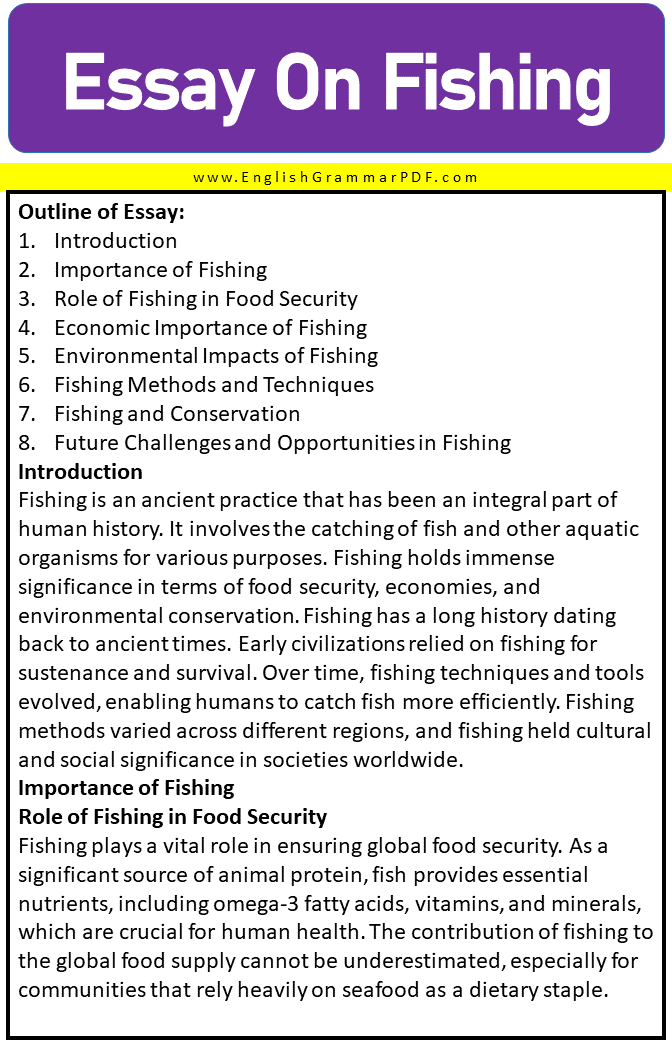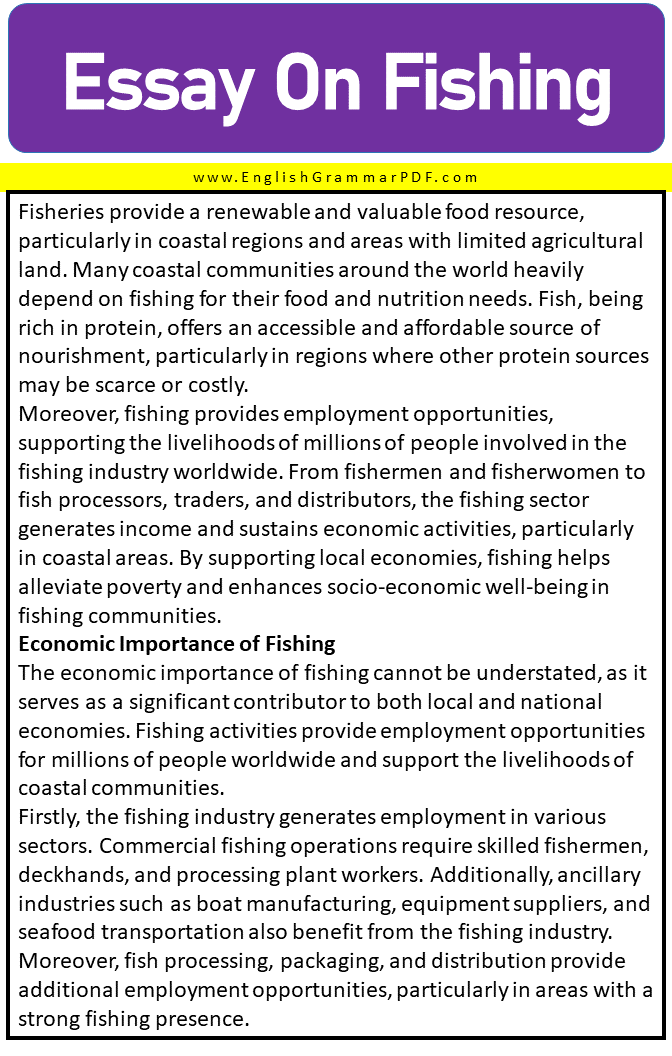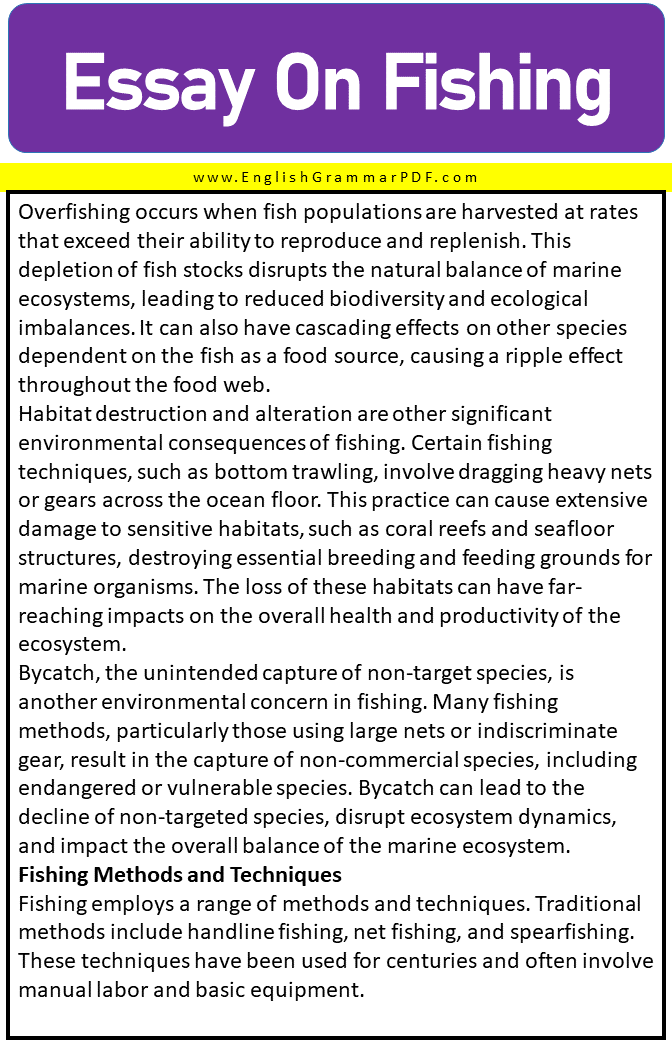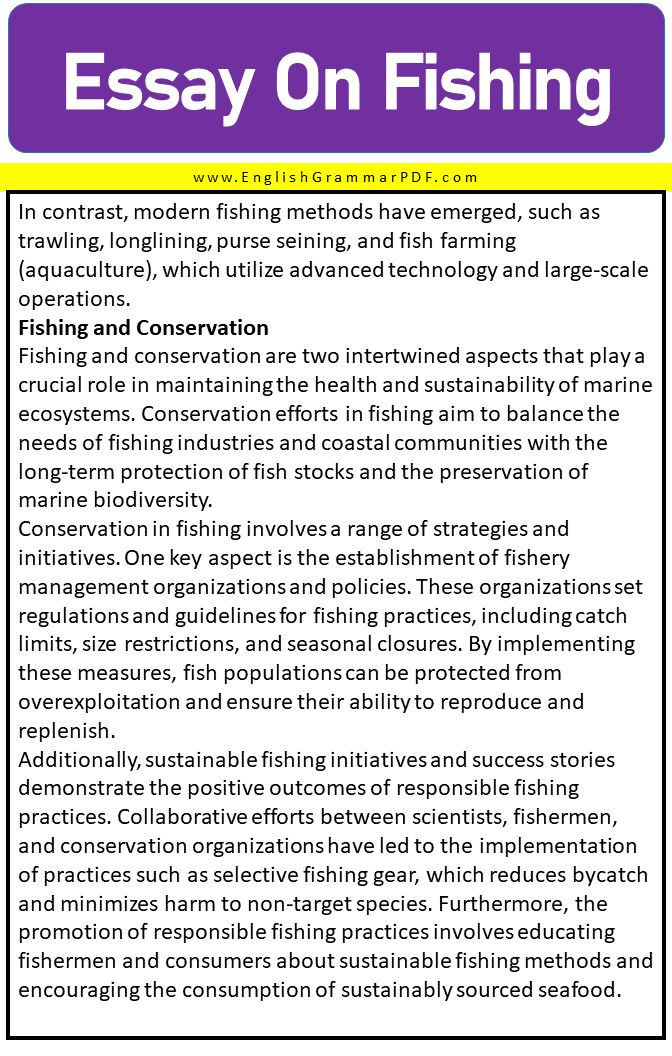Essay On Fishing
Outline of Essay:
- Introduction
- Importance of Fishing
- Role of Fishing in Food Security
- Economic Importance of Fishing
- Environmental Impacts of Fishing
- Fishing Methods and Techniques
- Fishing and Conservation
- Future Challenges and Opportunities in Fishing
Introduction
Fishing is an ancient practice that has been an integral part of human history. It involves the catching of fish and other aquatic organisms for various purposes. Fishing holds immense significance in terms of food security, economies, and environmental conservation. Fishing has a long history dating back to ancient times. Early civilizations relied on fishing for sustenance and survival. Over time, fishing techniques and tools evolved, enabling humans to catch fish more efficiently. Fishing methods varied across different regions, and fishing held cultural and social significance in societies worldwide.
Importance of Fishing
Role of Fishing in Food Security
Fishing plays a vital role in ensuring global food security. As a significant source of animal protein, fish provides essential nutrients, including omega-3 fatty acids, vitamins, and minerals, which are crucial for human health. The contribution of fishing to the global food supply cannot be underestimated, especially for communities that rely heavily on seafood as a dietary staple.
Fisheries provide a renewable and valuable food resource, particularly in coastal regions and areas with limited agricultural land. Many coastal communities around the world heavily depend on fishing for their food and nutrition needs. Fish, being rich in protein, offers an accessible and affordable source of nourishment, particularly in regions where other protein sources may be scarce or costly.
Moreover, fishing provides employment opportunities, supporting the livelihoods of millions of people involved in the fishing industry worldwide. From fishermen and fisherwomen to fish processors, traders, and distributors, the fishing sector generates income and sustains economic activities, particularly in coastal areas. By supporting local economies, fishing helps alleviate poverty and enhances socio-economic well-being in fishing communities.
Economic Importance of Fishing
The economic importance of fishing cannot be understated, as it serves as a significant contributor to both local and national economies. Fishing activities provide employment opportunities for millions of people worldwide and support the livelihoods of coastal communities.
Firstly, the fishing industry generates employment in various sectors. Commercial fishing operations require skilled fishermen, deckhands, and processing plant workers. Additionally, ancillary industries such as boat manufacturing, equipment suppliers, and seafood transportation also benefit from the fishing industry.
Moreover, fish processing, packaging, and distribution provide additional employment opportunities, particularly in areas with a strong fishing presence. The economic impact extends beyond the fishing industry itself, as the ripple effect stimulates local economies and supports other sectors such as tourism, hospitality, and retail.
Furthermore, fishing contributes to the economic growth of countries. It generates revenue through the export and trade of seafood products. Fishery products are highly valued in global markets, and countries with abundant fishery resources can benefit from exporting their catch.
The fishing industry’s economic impact is particularly significant for coastal nations heavily reliant on seafood exports. Income generated from the fishing industry can contribute to national development, infrastructure improvements, and poverty reduction.
Coastal communities, in particular, rely heavily on fishing as a source of income. Fishing provides these communities with sustainable livelihoods, allowing them to support their families and maintain their way of life. It plays a crucial role in preserving cultural heritage and traditions, as fishing activities are often deeply embedded in the social fabric of these communities.
Environmental Impacts of FishingFishing, while essential for food production and economic livelihoods, can have significant environmental impacts on marine ecosystems. These impacts arise from various fishing practices and can result in long-term damage to biodiversity and ecosystem health. Understanding and addressing these environmental effects is crucial for ensuring the sustainability of fishing practices.
One of the primary environmental impacts of fishing is overfishing. Overfishing occurs when fish populations are harvested at rates that exceed their ability to reproduce and replenish. This depletion of fish stocks disrupts the natural balance of marine ecosystems, leading to reduced biodiversity and ecological imbalances. It can also have cascading effects on other species dependent on the fish as a food source, causing a ripple effect throughout the food web.
Habitat destruction and alteration are other significant environmental consequences of fishing. Certain fishing techniques, such as bottom trawling, involve dragging heavy nets or gears across the ocean floor. This practice can cause extensive damage to sensitive habitats, such as coral reefs and seafloor structures, destroying essential breeding and feeding grounds for marine organisms. The loss of these habitats can have far-reaching impacts on the overall health and productivity of the ecosystem.
Bycatch, the unintended capture of non-target species, is another environmental concern in fishing. Many fishing methods, particularly those using large nets or indiscriminate gear, result in the capture of non-commercial species, including endangered or vulnerable species. Bycatch can lead to the decline of non-targeted species, disrupt ecosystem dynamics, and impact the overall balance of the marine ecosystem.
Fishing Methods and Techniques
Fishing employs a range of methods and techniques. Traditional methods include handline fishing, net fishing, and spearfishing. These techniques have been used for centuries and often involve manual labor and basic equipment. In contrast, modern fishing methods have emerged, such as trawling, longlining, purse seining, and fish farming (aquaculture), which utilize advanced technology and large-scale operations.
Fishing and Conservation
Fishing and conservation are two intertwined aspects that play a crucial role in maintaining the health and sustainability of marine ecosystems. Conservation efforts in fishing aim to balance the needs of fishing industries and coastal communities with the long-term protection of fish stocks and the preservation of marine biodiversity.
Conservation in fishing involves a range of strategies and initiatives. One key aspect is the establishment of fishery management organizations and policies. These organizations set regulations and guidelines for fishing practices, including catch limits, size restrictions, and seasonal closures. By implementing these measures, fish populations can be protected from overexploitation and ensure their ability to reproduce and replenish.
Additionally, sustainable fishing initiatives and success stories demonstrate the positive outcomes of responsible fishing practices. Collaborative efforts between scientists, fishermen, and conservation organizations have led to the implementation of practices such as selective fishing gear, which reduces bycatch and minimizes harm to non-target species. Furthermore, the promotion of responsible fishing practices involves educating fishermen and consumers about sustainable fishing methods and encouraging the consumption of sustainably sourced seafood.
Conservation also involves the establishment of marine protected areas (MPAs). These protected zones serve as sanctuaries for marine species, allowing them to reproduce and grow undisturbed. MPAs not only conserve biodiversity but also contribute to the replenishment of fish populations in surrounding areas, as larvae and juveniles migrate from the protected areas to other habitats.
Moreover, sustainable fishing certifications, such as the Marine Stewardship Council (MSC) certification, play a vital role in promoting sustainable fishing practices. These certifications provide consumers with the assurance that the fish they are purchasing has been caught using responsible methods and is sourced from well-managed fisheries. By supporting certified products, consumers can drive the market demand for sustainable fishing practices and encourage the fishing industry to adopt more environmentally friendly approaches.
Future Challenges and Opportunities in Fishing
The future of fishing presents both challenges and opportunities that will shape the industry’s sustainability and effectiveness. As we look ahead, several key factors will play a significant role in determining the future of fishing.
One of the major challenges facing fishing is climate change. Rising sea temperatures, ocean acidification, and changes in ocean currents and habitats pose significant threats to fish populations. These changes can alter the distribution and abundance of fish species, impacting the overall productivity of fisheries. Addressing climate change and its impacts on fish populations will require adaptive management strategies, including monitoring and adjusting fishing practices and exploring new fishing grounds.
Technological advancements also present opportunities for the fishing industry. Innovative tools and equipment can improve fishing efficiency while minimizing environmental impacts. Selective fishing gear can reduce bycatch, allowing for more sustainable fishing practices. Advanced monitoring systems, such as satellite technology and drones, can provide real-time data on fish stocks and fishing activities, enabling better management decisions.
Balancing economic needs with environmental sustainability is another crucial challenge. The fishing industry plays a significant role in many economies, providing employment and contributing to local and national economies. However, ensuring long-term sustainability requires careful management to prevent overfishing and habitat destruction. Implementing effective fisheries management practices, such as setting catch limits, establishing marine protected areas, and promoting sustainable fishing certifications, can help strike a balance between economic interests and conservation goals.
Collaboration among stakeholders is essential to address global fishing issues. Governments, fishing industries, scientists, and conservation organizations must work together to develop and implement effective policies and regulations. International cooperation is particularly important in addressing issues such as illegal, unreported, and unregulated (IUU) fishing, which undermines efforts toward sustainable fishing practices.
FAQ’s
Why do we love fishing?
People love fishing for several reasons, including the opportunity to relax in nature, the thrill of the catch, the sense of adventure, and the chance to spend quality time with friends and family.
What is fishing as a hobby?
Fishing as a hobby involves the recreational pursuit of catching fish. It provides individuals with an enjoyable and leisurely activity that allows them to escape the hustle and bustle of daily life and connect with nature.
What is the best skill for fishing?
One of the essential skills for fishing is patience. Being patient helps fishermen wait for the right moment to make their cast, and it allows them to endure periods of inactivity until a fish bites.
Download the PDF of the Essay:
Explore More Essays:










